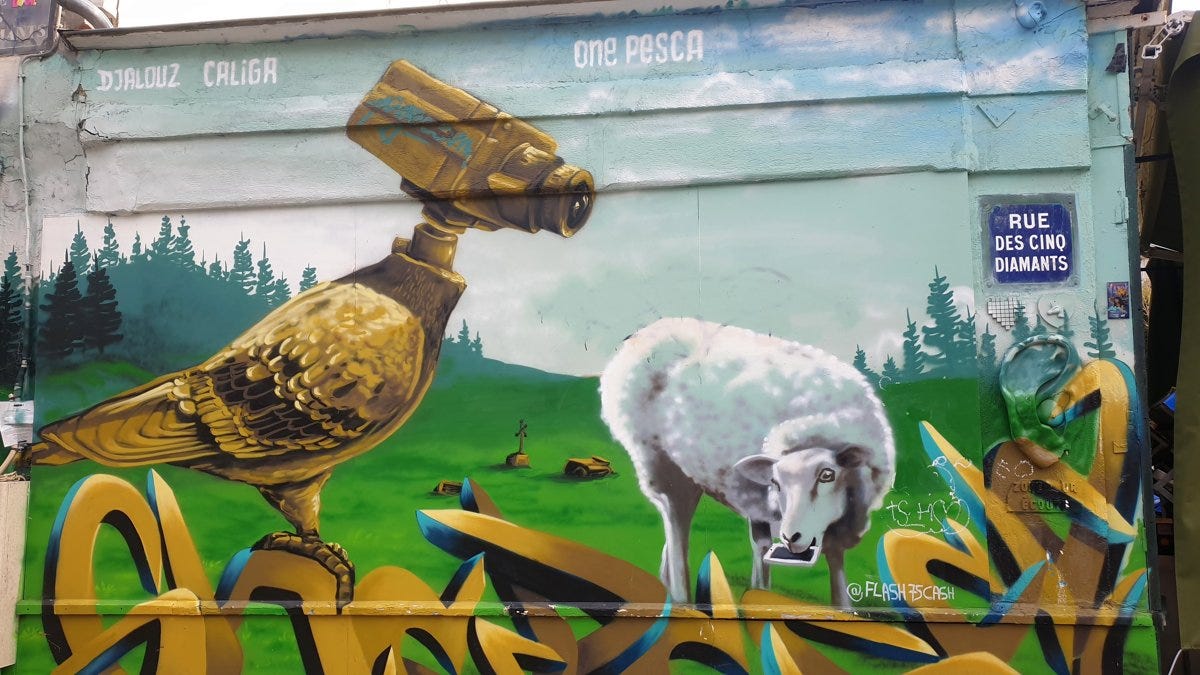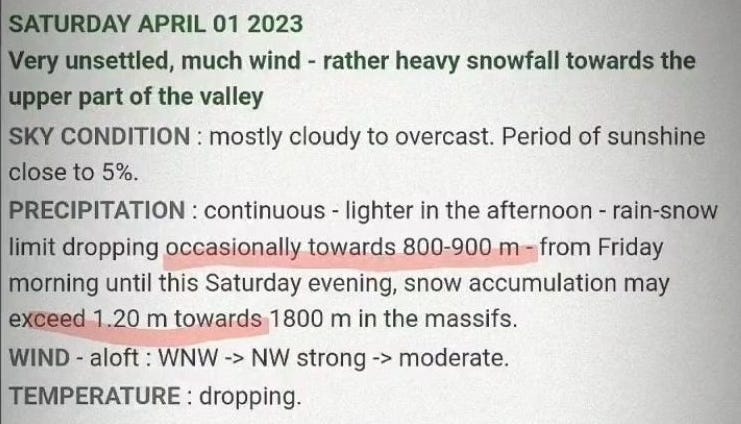Twice Buttered
“They’re repossessing everything. The bases, the ships… even Deckard. Apparently galactic law still regards him as a thing not a person.”
Happy Friday!
And welcome to Paris.
Rambling the streets south of Austerlitz on Wednesday, we happened upon Rue de Cinq Diamants — Five Diamond Street.
What caught our eye was the graffiti —
But Cinq Diamants is also home to Les Amies et Amis de la Commune de Paris 1871, an organisation that promotes the ideals of the Paris Commune, the radical working class who governed Paris for two months in 1871.
Besides the separation of church and state, the abolition of child labour and the right of employees to run their own businesses, the Commune also passed a law that postponed commercial debts and abolished the paying of interest on those debts.
I mention this because I was recently asked to write a short piece for the next issue of Red Pepper Magazine about David Graeber’s Debt: The First 5,000 Years.
The idea that ‘we should always pay our debts’ has become the self-evident moral foundation of our economic and political relations, but — as David Graeber shows inside the first four pages of Debt — that idea is total bollocks.
Always pay our debts? Really? Tell that to the bailed out banks, extractive, polluting industries and tax-avoidant billionaires and transnationals.
As David pointed out, debts are obligations that can be precisely quantified. That’s a critical distinction: debt is only one, deeply alienating, expression of how we manage our relations with others.
Whereas debts are precisely impersonal financial instruments, we can see the more general concept of obligation as a chain of generosity: gifts and favours of similar, but crucially not identical value, to be granted, not immediately, but at some appropriate time in the future, according to the needs of the recipient and resources of the obliged.
Obligations bring us together as a community; debts divide us.
For those of you new to these pages, hello 👋 My name is David and I’m a writer, outdoor instructor and cyclist-at-large with Thighs of Steel. I write stories that help you and me understand the world (and ourselves) a little better.
Sometimes I wander around a city and think about debt.
Welcome to edition 354.
Goldeous Kline And The Borrowful Glaxons
This is the title of a short story prompt that I offered the author David Varela way back in 2012.
David was doing a mad project where he took a monkish vow of silence, sat in a live-streamed cell and wrote short stories based on publicly-sourced prompts for 100 hours straight.
David took my prompt 95 hours into the project so he was understandably suffering from reality hallucinations, but I loved what he did with the title, transmuting it into a sci-fi parody about an interstellar civilisation that ‘went wild with the credit card’ on Finusian Champagne.
Another story about debt, with some sort of space bank on the tail of the Glaxon High Command:
“They’re repossessing everything. The bases, the ships… even Deckard. Apparently galactic law still regards him as a thing not a person.”
(The 100 Hours project is now offline, but you can catch up with David on his website and read the rest of his Glaxon short story on my website.)
So when Stephen Reid announced that he’d created a prompt engine for ChatGPT-4 that would use the AI to generate a blog post in his style based on user-suggested titles, I knew exactly what to do.
ChatGPT-4 is supposed to be better at unravelling fact from fiction than its language model predecessors , but the blog post the Reid-AI Cyborg spaffed out introduces Goldeous thusly:
Goldeous Kline and the Borrowful Glaxons by Aelius Blythe is a treasure trove of profound insights and mind-bending ideas that challenge our understanding of reality and reveal the intertwined nature of science and spirituality.
If you say so.
It’s worth noting too that, where David Varela’s Goldeous Kline was a daring woman space badass, ChatGPT’s is a male scientist.
In fairness, Aelius Blythe’s novel does sound pretty cool:
Through the interwoven stories of Goldeous Kline, a human scientist, and the Borrowful Glaxons, Blythe draws upon the profound insights of quantum physics to explore the connections between science and spirituality, illuminating the subtle and intricate dance between matter, energy, and consciousness that lies at the heart of existence.
Well, actually, it sounds like exactly the sort of book that former complexity scientist and founder of The Psychedelic Society Stephen Reid would love to read.
In lieu of any source material, ChatGPT will fulfil fantasies.
A lot of pixels have been spilt over the threat and promise of AI — and you’ll be glad to hear that I’m not interested in stuffing your brain with any more of that speculation.
But what David Varela and ChatGPT have reminded me is that every moment is a prompt and that we can choose to write and rewrite from an infinite, imaginative supply of stories everytime we answer that call to adventure.
In the end, Goldeous Kline and the Borrowful Glaxons is not only a thrilling adventure filled with scientific intrigue, but also a testament to the unifying power of curiosity, wonder, and trust in the face of uncertainty.
Days Of Adventure 2023: 12
🟢🟢🟢🟢🟢🟢🟢🟢🟢🟢🟢🟢 What is this?
Before the factory gate The worker suddenly stops himself The fair weather caught him by the coat And as he turns And looks at the Sun All red all round Smiling in his leaden sky He winks With familiarity - Hey, comrade Sun, Don't you think It's a bit dumb To give such a day To the boss?
Jacques Prévert, Le Temps Perdu
And this is the coming adventure…
Three Small Big Things At The End
1. Pedestrians and Cyclists Rule London
Walking is the number one way that Londoners get around. Number two is now cycling.
The number of motorists has fallen by 64% since 1999, while the number of cyclists has increased by 386%.
2. Treating Other People With Respect Gone Mad

3. Beavers Come To Ealing
Ealing is many things. The ‘Queen of the Suburbs’ is a major metropolitan centre, one stop shy on the mainline to London Paddington, home to 367,000 people, more than Nottingham, Coventry and Wigan.
It’s not the sort of place you’d expect to find beavers. Actual beavers.
But this is 2023. Anything is possible.
That’s all for this week.
I feel very lucky that I get to sit here and write to all 547 of you, picking up these words from 50 countries around the world.
That includes two of you 👋 in Argentina 🇦🇷 , home of the Cueva de las Manos, for 8,000 years an important stop on the cyclical, seasonal hunter-gatherer society circuit.
Between 7,300BC and 700AD, thousands of rock art paintings, including over two thousand hand stencils, were sprayed onto the cave walls using a bone spray pipe.

It doesn’t take a genius to make the link between the artwork painted at the Cueva de las Manos 9,300 years ago and the artwork sprayed onto the walls we passed on our walk around Paris… 🤯 OMG WE ARE SO CONNECTED.
Thank you for reading and I hope you found something to take away with you.
Don’t forget that this newsletter is community supported. It’s easy for you to pay what you feel it’s worth:
There’s also a tier where you can pay £50 or more. Whatever you choose, thank you.
Big love,
dc:




